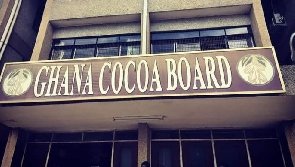2025: A GREAT YEAR TO CLOSE DOWN COCOBOD
Closing down Cocobod should be one of the first tasks of any new government in 2025.
Why should we close down Cocobod ?
First, some history. In 1937, farmers in the then Gold Coast (now Ghana) refused to continue selling cocoa at low prices set by European merchants and decided to withhold cocoa from the market. During a long strike, the British government established a Cocoa Marketing Board.
Out of the colonial Cocoa Marketing Board, the Ghana Cocoa Board (COCOBOD) was established in 1947 and a share of the net profit went to Ghana and the farmers. Until 1979, most of Ghana’s cocoa was sold to the United Kingdom.
Late President Kwame Nkruhmah made the Ghana Cocoa Board an important part of his Pan-africanism drive and part of his ideas for industrialization.
In 1984, COCOBOD underwent reforms aimed at subjecting the cocoa sector to market forces. Staff members were heavily reduced and there was an attempt to commercialise Cocobod.
However, real commercialization of Ghana’s Cocoa sector and Cocobod always failed due to political influence of both political parties involved. Great suggestions always came from the opposition and were nullified as soon as they came into power.
One political scandal after the other followed, the opening of a completely useless office in London at high costs (Cocoa was an easy product to sell) fertilizer scandals, financing unnecessary roads which have nothing to do with cocoa interests, appointments of directors, financing profits of political figures etc.
After losing on the activities for over 5 years, Cocobod announced a profit in 2023. However, they failed to explain to the Ghanain people how this profit was structured.
Due to restructuring Ghana’s debt as one of the criteria of the International Monetary Fund (IMF), Cocobod creditors agreed to accept 12.5% interest on their bonds instead of 30% and to defer their maturing bonds over 5 years.
Although the Chief Executive Officer of the Cocobod, Joseph Boahen Aidoo, said “before the restructuring, we were paying interest of around 30 per cent. However, with the restructuring, the coupon rates have reduced to 12.5%”, nobody has adjusted the profits of 2023.
However, the foreign banks and financing institutions are not stupid, so even posting this profit after 5 years of losses resulted in zero international interest to pre-finance Ghana’s Cocoa season.
To me, as a semi-retired businessman it has always been a surprise how a company founded in 1947 could still not finance its own production 77 years later ?
So why my article closing Cocobod ?
Lets look at the world largest producing country Cote D’Ivoir.
No Cocobod, no state institution involved, yes they have regulations but there is no farmer “forced” to sell its crop to an institution like Cocobod.
Yet the cocoa sector is: Self financing, the farmers decide themselves who to sell to, over 100 companies are buying and selling cocoa creating a fair competitive market due to which farmers are profiting, over 40 farmers cooperatives are functioning well and fertilizers are bought based on best results and competitive prices.
I am sure some people will say, yes but Cocobod also has its research center for crop development. Indeed, but so has Ivory Coast which is called CIRAD and functioning well.
The creation of the Cocoa Initiative in 2018 was more in Ghana’s interest than in Cote D’ Ivoir’s interest. The main goal was to stabilize prices for farmers. Did it work ?
No, because the market reacts faster than the regulators and the Cedi falls quicker than the Euro and USD, so prices set in Cedi will be outdated several weeks later. All that it does is diverting smuggling from Ghana to Ivory Coast and vice-versa is creating new smuggle routes to Burkina Faso and Togo.
My point is, like my headline; get rid of water headed company that is supposed to be in the best interest of farmers and Ghana.
CLOSE COCOBOD, end eternal losses and burdens, scrap political influences and sell its properties to generate hard needed income for our country in dire need of money.
Author: the writer, Nico van Staalduinen, just a concerned Ghanaian.








